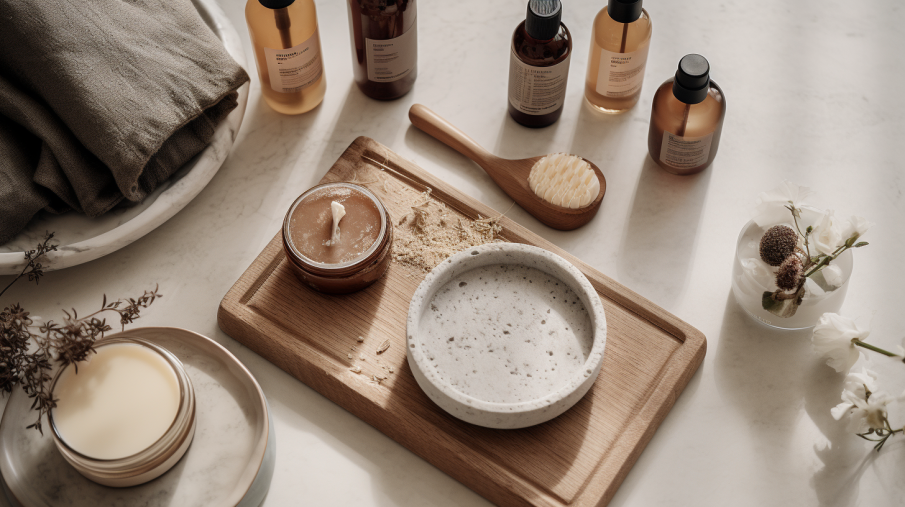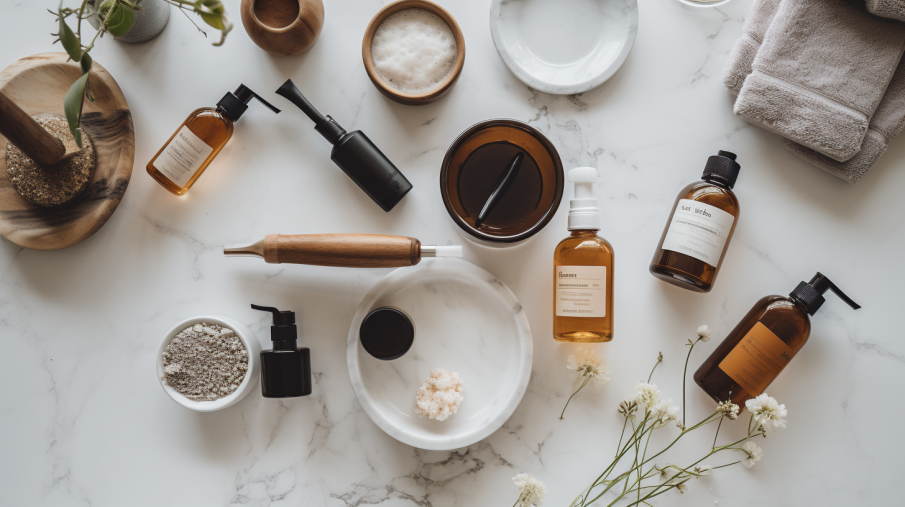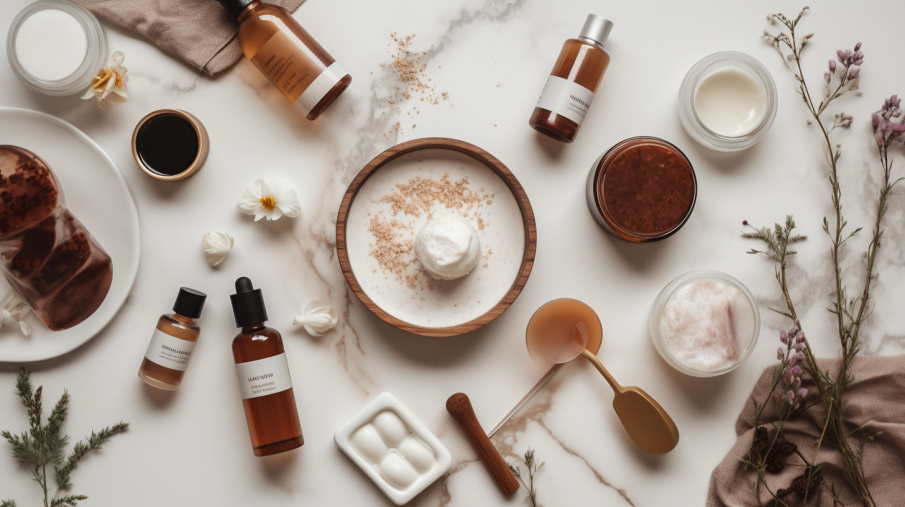The Benefits Of Exfoliation: How To Achieve Radiant, Healthy Skin In 5 Simple Steps
As an Amazon Associate, I earn from qualifying purchases.
Disclosure: Some of the links in this article may be affiliate links, which can provide compensation to me at no cost to you if you decide to purchase a paid plan. You can read our affiliate disclosure in our privacy policy.
The Benefits Of Exfoliation: How To Achieve Radiant, Healthy Skin In 5 Simple Steps
Introduction: Benefits Of Exfoliation For Radiant, Healthy Skin
Have you ever wondered how to achieve that radiant, healthy glow for your skin? Look no further! In this blog post, we’ll explore the numerous benefits of exfoliation in just five simple steps.
Exfoliation is a game-changer when it comes to revitalizing and brightening your complexion by gently removing dead skin cells and promoting new cell growth.
Not only will regular exfoliation leave your skin looking fresh and vibrant, but it also prevents acne and reduces signs of aging.
Key Takeaways
- Exfoliation helps remove dead skin cells, stimulate cell renewal, and improve texture and tone for a healthy, radiant complexion.
- Choosing the right exfoliator for your skin type and concerns is crucial to achieving optimal results without causing irritation or damage.
- Preparation of your skin before exfoliation and following up with moisturizer and sunscreen are necessary steps to restore moisture levels and protect against sun damage.
- Consistency is key when it comes to effective skincare through regular appropriate exfoliation practices tailored to one’s individual needs.

Understanding Exfoliation And Its Importance For Skin Health
Exfoliation is the process of removing dead skin cells from the surface of the skin, and it plays an important role in improving texture, tone, and overall skin health.
Removal Of Dead Skin Cells
One of the key benefits of exfoliation is the removal of dead skin cells. As we go about our daily lives, our skin constantly sheds old, dead cells and replaces them with fresh, new ones.
Exfoliating regularly aids in sloughing off these accumulated dead skin cells to reveal healthier, more vibrant layers beneath. For example, using a gentle scrub or an alpha hydroxy acid (AHA) treatment will help loosen and remove this layer effectively.
Not only does this process uncover brighter-looking skin but also improves overall texture by minimizing fine lines and wrinkles caused by dehydration or aging.

Benefits Of Stimulation Of Cell Renewal
One of the significant advantages of exfoliation is its ability to stimulate cell renewal, which is crucial for maintaining a youthful and radiant complexion. As we age, our skin’s natural cell turnover process slows down, resulting in a dull appearance and an accumulation of dead skin cells on the surface.
Stimulating cell renewal also helps reduce visible signs of aging such as fine lines and wrinkles by boosting collagen production. Collagen is a vital protein responsible for maintaining skin elasticity and firmness; however, its production naturally declines as we grow older.
Regular exfoliation not only removes dead cells but also sends signals to our body to increase collagen synthesis, resulting in smoother and more youthful-looking skin. Additionally, improved cell turnover can help fade dark spots and hyperpigmentation by revealing newer, brighter layers beneath the surface.

Improvement Of Texture And Tone
Exfoliation is a game-changer when it comes to improving the texture and tone of your skin. By gently removing the outer layer of dead skin cells, exfoliation reveals fresher, smoother skin that is more even in both color and surface appearance.
One example of improved tone through exfoliation includes targeting dark spots left behind after acne breakouts or sun damage. Chemical exfoliants like alpha hydroxy acids (AHAs) or beta hydroxy acids (BHAs), such as glycolic acid or salicylic acid, have the ability to penetrate deeper into the layers of the skin and speed up cell turnover rates.
This process helps fade these marks over time while also boosting collagen production for firmer-looking skin. Additionally, incorporating physical exfoliators like scrubs or washcloths into your skincare routine can help minimize fine lines and wrinkles, leaving you with a more youthful appearance overall.

Treatment Of Acne And Reduced Pore Size
Exfoliation is not just beneficial for the overall texture and tone of your skin, but also for treating acne and reducing pore size. Regularly exfoliating can help remove excess oil, dirt, and dead skin cells that clog pores and lead to breakouts.
In addition to preventing pimples, exfoliation could help minimize enlarged pores caused by excess sebum production. When you remove build-up on the surface of your face with regular exfoliation, it allows space for new cell growth and boosts collagen production.
However, be mindful not to over-exfoliate or choose harsh products that may irritate or inflame your skin further.

Enhanced Product Absorption
Exfoliation not only removes dead skin cells and unclogs pores but also allows for better product absorption. By getting rid of the top layer of dead skin, your skincare products can penetrate deeper into your skin and deliver their active ingredients more effectively.
This is particularly important for those with dry or aging skin as it can help increase moisture retention and boost collagen production.
Some key ingredients that work well in conjunction with exfoliating are retinol and vitamin C serums as they have a harder time penetrating through the dead cell barrier.
How To Achieve Radiant, Healthy Skin In 5 Simple Steps
To achieve radiant, healthy skin in 5 simple steps, start by determining your skin type and frequency of exfoliation, then choose the right exfoliator for your concerns, prepare your skin before exfoliating, apply the product in gentle circular motions, and follow up with moisturizer and sun protection.
Step 1: Determine Your Skin Type And Frequency Of Exfoliation
Before starting the exfoliation process, it is important to determine your skin type and how often you should exfoliate. Different skin types require different levels of exfoliation to avoid irritation or over-exfoliation.
It is also crucial to consider the frequency of your exfoliation routine. Over-exfoliating can strip away essential oils and damage the protective barrier on our skin leading to dehydration and breakouts.
Overall, taking into account your specific concerns as well as what works best for your individual needs will help you achieve optimal results when it comes to effective skincare through regular and appropriate exfoliation practices.
Step 2: Choose The Right Exfoliator For Your Skin Concerns
Choosing the right exfoliator for your skin concerns is crucial to achieving radiant, healthy skin. There are many options available, from physical scrubs to chemical treatments with alpha or beta hydroxy acids.
If you have dry or sensitive skin, a gentle physical exfoliant like a washcloth or sponge may be best suited for you.
It’s important to consider not only your skin type but also any specific concerns you may have such as aging, fine lines, dark spots or uneven texture. Retinol and retinoids can help combat signs of aging while enzymatic peels can gently remove dead cells without irritating the skin.
Consulting with a board-certified dermatologist can be helpful in choosing an appropriate exfoliant that meets your individual needs.
Step 3: Preparation Of Your Skin Before Exfoliation
Before exfoliating, it is crucial to prepare your skin properly. Start by washing your face with a gentle cleanser to remove any dirt and oil that may be present on the surface of your skin.
After cleansing, pat your face gently with a clean towel to remove excess water. You can also use a facial sponge or washcloth if you have sensitive skin.
This will help to improve blood circulation in the area and make sure that all areas of your face are equally prepared for exfoliation.
Step 4: Application Of The Exfoliating Product In Gentle, Circular Motions
After choosing the right exfoliator and preparing your skin, it is time to apply the product. Apply the exfoliating scrub or chemical exfoliant using gentle, circular motions with your fingertips or a soft washcloth.
Be sure to use light pressure when applying an exfoliating product as rubbing too hard can cause irritation and damage to the skin.
When it comes to chemical exfoliants like alpha hydroxy acids (AHAs) or beta hydroxy acids (BHAs), be mindful of how long you leave them on your skin before rinsing off.
Remember, consistency is key when it comes to achieving healthy, radiant-looking skin through regular exfoliation!

Step 5: Follow-up With Moisturizer And Sun Protection
After exfoliating, it is crucial to moisturize your skin and protect it from the sun. Exfoliation can leave your skin dry and stripped of essential oils, so applying a hydrating moisturizer will help restore moisture levels.
Look for a moisturizer that contains ingredients like hyaluronic acid or glycerin, which are excellent humectants that attract water to the skin.
Remember to apply sunscreen regularly throughout the day if you’re spending time outside for extended periods. Sun protection should be part of your daily routine regardless of the weather conditions since UVA/UVB rays can still penetrate through clouds.
Overall, taking care of your skin post-exfoliation is just as important as exfoliation itself.
Additional Tips For Optimal Skin Health
Proper hydration and a healthy diet, consistent skincare routine, avoiding harsh products and over-exfoliation are additional tips for achieving optimal skin health.
Proper Hydration And A Healthy Diet
In addition to regular exfoliation, proper hydration and a healthy diet are essential for achieving radiant, healthy skin. Drinking water throughout the day helps to flush out toxins from the body and keeps the skin hydrated from within.
A well-balanced diet that includes plenty of fruits and vegetables is also important for maintaining healthy skin. Foods rich in antioxidants such as berries, leafy greens, and nuts can help reduce inflammation and protect against environmental damage.
Eating foods high in vitamin C like citrus fruits or bell peppers can improve collagen production, which is crucial for keeping skin firm and youthful-looking.
Proper hydration is vital for supple skin; dehydration can make wrinkles more noticeable. A balance between omega-3s (found in fatty fish) and omega-6s (in oils like safflower) can keep cell walls strong so they don’t lose water quickly.
Consistent Skincare Routine
Keeping a consistent skincare routine is crucial for maintaining healthy, radiant skin. It’s essential to cleanse and moisturize your skin every day to remove impurities and keep it hydrated.
Exfoliation should also be included in your regular routine to help remove dead skin cells and improve cell turnover.
Additionally, it’s important to remember that sticking with a skincare routine takes time and patience. Results may not be immediate, but by committing to a consistent routine, you are setting yourself up for long-term success in achieving healthy-looking skin.
And don’t forget that everyone’s skin is different, so finding what works best for you may take some trial-and-error.
Avoid Harsh Products And Over-Exfoliation
To avoid damaging your skin, it’s essential to use gentle exfoliants and not over-exfoliate. Overdoing it can lead to irritation, dryness, and even breakouts.
It’s important to choose the right type of exfoliant for your skin type and concerns.
When selecting products for chemical exfoliation, start with lower concentrations of alpha hydroxy acids (AHAs) or beta hydroxy acids (BHAs). These ingredients work on different levels of the skin and are excellent at removing dead cells without causing damage.
It’s essential to pay attention to how often you exfoliate as well.
Overall proper care before during & after -exfiloation helps maintain optimal health for our largest organ – Skin!
Conclusion: Regular And Effective Exfoliation Is Crucial For Achieving Radiant And Healthy Skin
If you’re looking to achieve radiant and healthy skin, regular exfoliation is key. By removing dead skin cells, stimulating cell renewal, and improving texture and tone, exfoliation can help with dryness, pigmentation issues, acne-prone skin, wrinkles, and more.
It’s simple to get started with just five easy steps: determine your skin type and frequency of exfoliation; choose the right product for your needs; prepare your skin before applying the product; apply gently in circular motions; and follow up with moisturizer and sun protection.
For optimal results, be sure to also maintain a consistent skincare routine that includes hydration from within through drinking plenty of water as well as eating a balanced diet.
FAQs:
1. Why is exfoliation important for achieving healthy skin?
Exfoliation helps to remove dead skin cells that can clog pores and lead to dull, uneven skin texture. This process promotes cell turnover, which can reveal brighter, smoother, and healthier-looking skin.
2. How often should I exfoliate my skin?
It depends on your individual skin type and sensitivity. Generally speaking, once or twice a week is recommended for most people with normal or combination skin. However, those with sensitive or dry skin may need to limit their exfoliation to once every two weeks while those with oily or acne-prone skin may benefit from more frequent treatments.
3. What are the best ways to exfoliate my face?
The five simple steps mentioned in this article include using a gentle cleanser before applying an exfoliating product such as a facial scrub or chemical peel, massaging the product onto your face in circular motions using light pressure, rinsing thoroughly with lukewarm water and patting dry; following up with toner & moisturizer.
4. Can over-exfoliating damage my skin?
Yes ,over-exfoliating can damage your delicate facial tissue due to excessive stripping of natural oils that help maintain moisture levels.While it is important to regularly cleanse & gently remove buildup from pore openings –those suffering from adult acne/rosacea/hypersensitive conditions should consult physician prior engaging in this practice excessively not risk damaging barrier leading various other sensitivities since this could result further problems like inflammation,sensitivity,dryness etc!
Source URLs
https://www.eccotique.com/blogs/news/why-is-exfoliation-so-important-for-your-skin
https://www.byrdie.com/how-to-exfoliate-best-exfoliating-tips-for-the-face-and-body-345926
https://beautyblender.com/blogs/beauty-101/what-is-exfoliation
https://naturalfrenchsoap.com/blogs/soapedia/7-benefits-of-exfoliating-find-out-how-to-exfoliate







